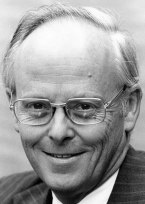2013 saw the losses of truly legendary pioneers in computer technology. We look back at four who left their marks.
Douglas Engelbart
There really isn’t any single person more responsible for the look and feel of a modern computer than Douglas Engelbart. The Mother of All Demos is the single most prescient, visionary and revolutionary technology demo ever created.
Engelbart’s team at Stanford Research Institute spent the 1960s inventing the year 2000. Some of their innovations are only just now becoming mainstream. The list of Engelbart and SRI inventions, as shown in the Mother of All Demos, feature the following technological advances:
• The mouse
• The chording keyboard
• The on-screen cursor/mouse paradigm
• The Word Processor
• The Internet-based collaborative Word Processor
• The concept of files for documents
The list goes on, because many of the innovations at SRI were eventually fully formed under the guise of Xerox PARC’s Palo Alto laboratories.

Engelbart’s influence will continue to be felt throughout computing forever. Without him and his work, we’d all be sitting here alone, without pointing devices or a friendly face of computing for the masses. It’s possible that, without Engelbart, the personal computing revolution might never have happened.
Aaron Swartz
Aaron was the wunderkind of the Internet freedom movement. His work on the RSS specification gained him early fame among the Web development community. His fiery passionate views on information freedom and personal liberties earned him an equal amount of friends and enemies. No matter what you thought of Aaron, however, there was no denying his talent, intelligence and passion for what he felt was right.
Swartz’s suicide was largely blamed on his pending federal criminal charges related to his use of an academic database. Due to his militant beliefs that information should be free, he stashed a laptop in an MIT basement and had it download the JSTOR database.

He was caught and brought up on some relatively stiff charges. His decisions around the case may not have been the best, but his choices did bring a major spotlight onto federal cybercrime laws. The debate over the severity of these laws continues to this day, and Swartz is considered a symbol of the harsh hand of federal laws.#!
Mitch Hill
Opscode’s former CEO passed this year, due to pancreatic cancer. Mitch Hill was a competitive athlete in addition to a talented tech leader, and his tenure at Opscode was market by strong growth and rapid market adoption.

Coworkers described Mitch as a super level-headed guy, who was able to inspire his employees to do their best. While Hill will certainly be missed, he does leave behind a profoundly popular and useful company in Opscode, which continues to grow in the configuration-management market.
Jack Harker
A World War II Navy veteran, Harker took his wartime experience in electronics repair to IBM. Among his accomplishments were leading the development of the 1311 Disk File project and developing the IBM 305 RAMAC, the first commercial computer that used magnetic disk storage. Lasting inventions of him and his teams were self-acting air bearings in disk drives and removable disk storage.

Harker remained with IBM until 1987, working on other projects such as the IBM 1360 and the IBM 3340 “Winchester” disk drive.


